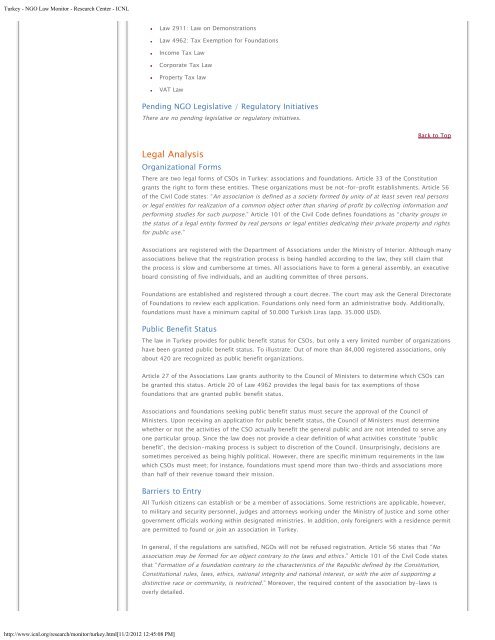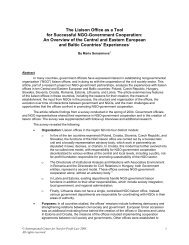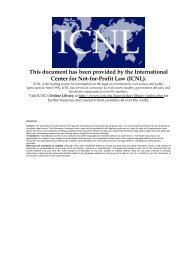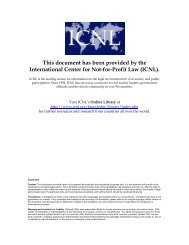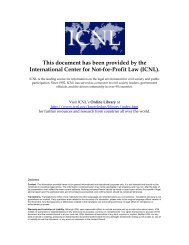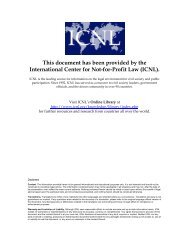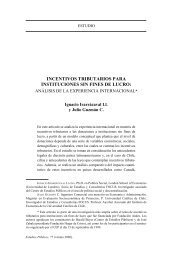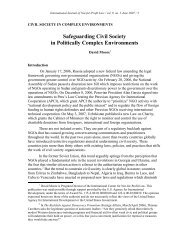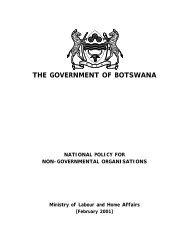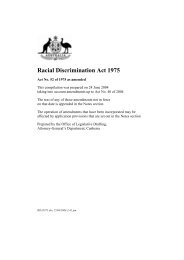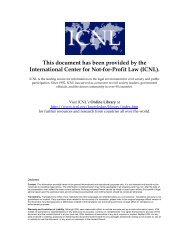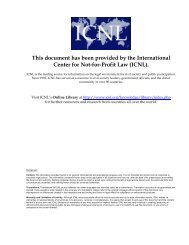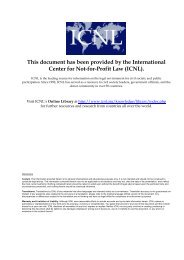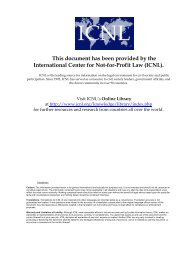Turkey - NGO Law Monitor - Research Center - ICNL
Turkey - NGO Law Monitor - Research Center - ICNL
Turkey - NGO Law Monitor - Research Center - ICNL
Create successful ePaper yourself
Turn your PDF publications into a flip-book with our unique Google optimized e-Paper software.
<strong>Turkey</strong> - <strong>NGO</strong> <strong>Law</strong> <strong>Monitor</strong> - <strong>Research</strong> <strong>Center</strong> - <strong>ICNL</strong><br />
http://www.icnl.org/research/monitor/turkey.html[11/2/2012 12:45:08 PM]<br />
<strong>Law</strong> 2911: <strong>Law</strong> on Demonstrations<br />
<strong>Law</strong> 4962: Tax Exemption for Foundations<br />
Income Tax <strong>Law</strong><br />
Corporate Tax <strong>Law</strong><br />
Property Tax law<br />
VAT <strong>Law</strong><br />
Pending <strong>NGO</strong> Legislative / Regulatory Initiatives<br />
There are no pending legislative or regulatory initiatives.<br />
Legal Analysis<br />
Organizational Forms<br />
Back to Top<br />
There are two legal forms of CSOs in <strong>Turkey</strong>: associations and foundations. Article 33 of the Constitution<br />
grants the right to form these entities. These organizations must be not-for-profit establishments. Article 56<br />
of the Civil Code states: “An association is defined as a society formed by unity of at least seven real persons<br />
or legal entities for realization of a common object other than sharing of profit by collecting information and<br />
performing studies for such purpose.” Article 101 of the Civil Code defines foundations as “charity groups in<br />
the status of a legal entity formed by real persons or legal entities dedicating their private property and rights<br />
for public use.”<br />
Associations are registered with the Department of Associations under the Ministry of Interior. Although many<br />
associations believe that the registration process is being handled according to the law, they still claim that<br />
the process is slow and cumbersome at times. All associations have to form a general assembly, an executive<br />
board consisting of five individuals, and an auditing committee of three persons.<br />
Foundations are established and registered through a court decree. The court may ask the General Directorate<br />
of Foundations to review each application. Foundations only need form an administrative body. Additionally,<br />
foundations must have a minimum capital of 50.000 Turkish Liras (app. 35.000 USD).<br />
Public Benefit Status<br />
The law in <strong>Turkey</strong> provides for public benefit status for CSOs, but only a very limited number of organizations<br />
have been granted public benefit status. To illustrate: Out of more than 84,000 registered associations, only<br />
about 420 are recognized as public benefit organizations.<br />
Article 27 of the Associations <strong>Law</strong> grants authority to the Council of Ministers to determine which CSOs can<br />
be granted this status. Article 20 of <strong>Law</strong> 4962 provides the legal basis for tax exemptions of those<br />
foundations that are granted public benefit status.<br />
Associations and foundations seeking public benefit status must secure the approval of the Council of<br />
Ministers. Upon receiving an application for public benefit status, the Council of Ministers must determine<br />
whether or not the activities of the CSO actually benefit the general public and are not intended to serve any<br />
one particular group. Since the law does not provide a clear definition of what activities constitute “public<br />
benefit”, the decision-making process is subject to discretion of the Council. Unsurprisingly, decisions are<br />
sometimes perceived as being highly political. However, there are specific minimum requirements in the law<br />
which CSOs must meet; for instance, foundations must spend more than two-thirds and associations more<br />
than half of their revenue toward their mission.<br />
Barriers to Entry<br />
All Turkish citizens can establish or be a member of associations. Some restrictions are applicable, however,<br />
to military and security personnel, judges and attorneys working under the Ministry of Justice and some other<br />
government officials working within designated ministries. In addition, only foreigners with a residence permit<br />
are permitted to found or join an association in <strong>Turkey</strong>.<br />
In general, if the regulations are satisfied, <strong>NGO</strong>s will not be refused registration. Article 56 states that “No<br />
association may be formed for an object contrary to the laws and ethics.” Article 101 of the Civil Code states<br />
that “Formation of a foundation contrary to the characteristics of the Republic defined by the Constitution,<br />
Constitutional rules, laws, ethics, national integrity and national interest, or with the aim of supporting a<br />
distinctive race or community, is restricted.” Moreover, the required content of the association by-laws is<br />
overly detailed.


